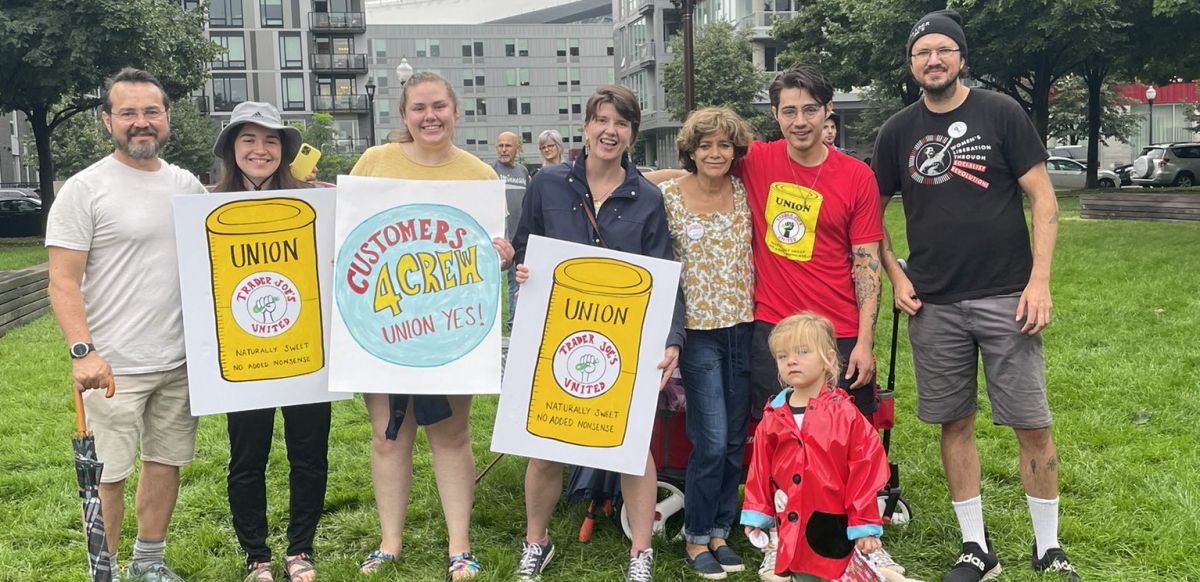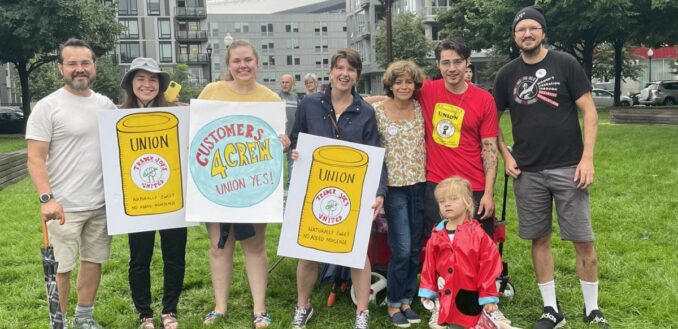

Union supporters at Traders Joe’s in Minneapolis demonstrate in August, 2023. Trader Joe’s, Amazon and Tesla have all sued to eliminate the National Labor Relations Board. Credit: Trader Joe’s United
Passed in 1935, the National Labor Relations Act, also known as the Wagner Act, enshrined in law the right of workers to engage in collective action — “protected concerted activity” — against their bosses. First and foremost, this meant workers had the right to unionize. The Act’s passage did not occur in a vacuum; it followed the 1934 general strikes in San Francisco and Minneapolis, with a third threatened in Toledo, Ohio.


Union supporters at Traders Joe’s in Minneapolis demonstrate in August, 2023. Trader Joe’s, Amazon and Tesla have all sued to eliminate the National Labor Relations Board. Credit: Trader Joe’s United
The capitalists tried to have the Act overturned, taking it all the way to the Supreme Court of the United States. Jones and Laughlin Steel filed suit after the National Labor Relations Board, the body formed in 1935 to enforce the NLRA, ordered the company to reinstate 10 workers fired for union organizing. The bosses said the Wagner Act was unconstitutional.
Lower courts had sided with Jones and Laughlin and court watchers predicted the defeat of the Wagner Act. But SCOTUS was hearing the case in 1937, a year of hundreds of sit-down strikes following the victory of the United Auto Workers against General Motors in Flint, Michigan. The court ruled 5-4 to let the Act stand.
While the 1947 Taft-Hartley Act imposed severe restrictions on the rights of unions, modifying the NLRA, the Wagner Act itself has remained in place for 89 years.
Now, three major union-busting companies — Amazon, Tesla and Trader Joe’s — have filed lawsuits arguing for the abolition of the NLRB, again on bogus constitutional grounds. The Board has issued rulings against all three companies; Amazon and Trader Joe’s were ordered to reinstate fired workers and Tesla was told it could not prevent workers from wearing pro-union shirts.
NLRB has no enforcement powers
The NLRB is actually a rather toothless body, with no power to impose fines or penalties — and certainly not jail time — when capitalists violate U.S. labor laws. Companies can appeal NLRB rulings to higher courts, a process that can drag on for years, putting workers’ rights in limbo. Sometimes the courts side with employers; such was the case when the NLRB ruling against Tesla over pro-union shirts was overturned.
Sometimes the NLRB itself sides with the bosses, including with Tesla when it fired union supporters in Buffalo, New York, in 2023. The Board agreed with Tesla that the dozens of workers were fired over “performance reviews,” although it upheld other charges filed by Tesla Workers United.
Despite Starbucks Workers United winning union elections in over 400 stores in the U.S., the coffee chain has been able to sidestep the NLRB, refusing to negotiate a single contract.
The NLRB’s election process, where workers vote by secret ballot on whether or not they want to be represented by a union, is time-consuming. It has given companies, such as Amazon in Bessemer, Alabama, and elsewhere, time to propagandize and intimidate workers into voting against union representation.
Capitalists want unlimited exploitation of workers
Nevertheless, Tesla, Amazon and Trader Joe’s have been the subject of enough negative rulings by the NLRB that they want to abolish it altogether. And the bosses can’t be happy with the recent revision of NLRB practice to allow unions to bypass an election and win recognition through a “card check” showing a majority of employees want a union.
The demands of these capitalists are not as extreme as those in 1937, when Jones and Laughlin sued to overturn the Wagner Act altogether. Their arguments rest on different clauses of the U.S. Constitution. But the ultimate goals are identical: completely unfettered ability to exploit the working class for profit, with no restrictions from unions — or by the limited labor laws workers won through struggle.
These corporate bosses want to roll history back almost 100 years to an era when workers had no legal right to organize and faced prosecution for so-called “criminal syndicalism.”
Regardless of how SCOTUS rules, the working class will have to fight tooth and nail to win not only union recognition but contracts that guarantee decent wages, benefits, job security and working conditions.
Philadelphia On March 26, the Pennsylvania Supreme Court denied political prisoner Mumia Abu-Jamal permission to…
There are two important and overlapping holidays on April 22: Earth Day and Vladimir Lenin’s…
Twelve people were arrested April 9 for blocking traffic to Travis Air Force Base, a…
Secretary-General of Hezbollah Sheikh Naim Qassem delivered a speech on April 18, 2025. Resistance News…
Anakbayan Philadelphia held a rally on April 19 to demand the U.S. end its military…
Boston, April 20, 2025 The leadership of the Democratic Party nationally and especially in Massachusetts…